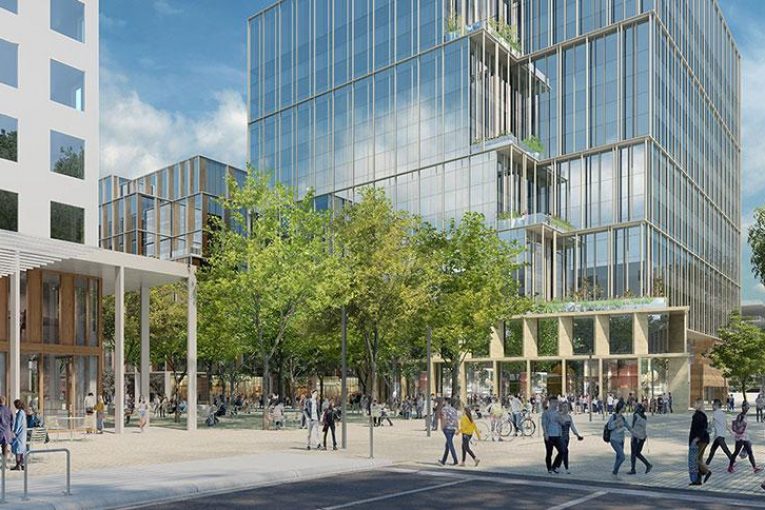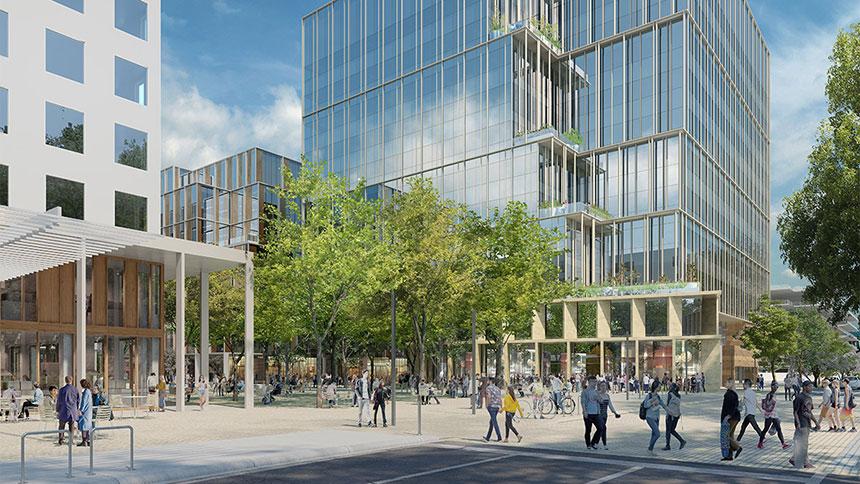

By Jacob Vito
Gentrification is the process of buying land for development with wealthier markets in mind, ultimately forcing out the area’s current residents. It is a phenomenon that asks a simple question: what’s the profit margin in taking away someone’s way of life? Now, such a question is being asked in the courts of Sacramento.
According to a Sacramento Bee report, a lawsuit has been filed against the University of California over its Sacramento-based Aggie Square building endeavor. A university expansion project near the UC Davis Medical Center allegedly failed to mitigate the air pollution and housing displacement it would cause.
Sacramento Investment Without Displacement (SIWD), the organization filing the suit, has argued that the current building plans will only exaggerate gentrification and housing inequities in a community that is 59 percent renters.
However, Sacramento city council members have suggested that the project is necessary for economic development, creating thousands of construction jobs during an economically tumultuous time.
Make no mistake: SIWD is fair to be concerned about housing displacement in Sacramento. A USA Today analysis reported that the city is one of the ten cities most affected by gentrification.
However, with the support of the UC system and the city council members, this suit is unlikely to stop the billions already put behind this project. However, a lone lawsuit is far from the best tool to combat the gentrification phenomenon.
The actions of SIWD are admirable, but they are ultimately both ineffective and misplaced. A growing university system like the University of California requires growing campuses to match. What’s more, the value of property in Sacramento has been increasingly rising over the last ten years, according to a KCRA article. If a public university does not buy up space for development, a private contractor that offers even less to the community surely will.
But if such a displacement of people is not attributable to UC Davis, then who is to blame? There is no individual or organization at fault here. Instead, the damage here lies in a far more systemic place.
The causation of gentrification, displacement and the destruction of communities is, in short, the character of American society itself.
The United States is a culture long-trained to not care about human life. It gives no guarantees or promises of safety, with even the assistance programs that do exist resembling a walk on a trapeze wire. For all the inalienable rights we are supposedly endowed with from birth, none seem to save us from a country that would rather have a new parking complex than a solution to homelessness.
We are such violent things.
In our hands, we as a species hold the power to do just about anything. We could conquer the stars. We could end world hunger. We could pool our resources and ensure a survivable and climate change-free Earth for centuries to come. With very little effort, the threat of homelessness and community destruction could be eradicated.
Yet here we remain, so enthralled with means, testing who “deserves” to be helped that we ignore the millions we could have saved. This willing inaction, this choice to let needless suffering proliferate, is itself a kind of perverse violence, one that does far more damage than any physical blow.
And during this pandemic, during this era of death and collapse, we continue it. We discard the homeless and jobless, offering them one-time checks that can’t even cover a month’s expenses in most cities. America could save those needlessly suffering from circumstances far outside their control, but instead, it leaves them with nothing. Like the conditions it leaves its vulnerable in, the character of this nation is decaying away.
How can we live with ourselves? How do we excuse the needless destruction of the lives and communities of millions? What deep flaw has allowed for such a moral failure?
Usually, I end even the bleakest stories with some motivator. “Sure, the world may be bad, but don’t forget that things can get better!” But no individual can fix an error this systemic, culturally rooted and ingrained.
Ours is a social species. Thus, if we somehow cannot perform the simple task of caring for our own, we will wither. By failing to guarantee a need as universal as a home, the United States is actively failing to ensure its survival.
We must stop this. It’s hard to say how a disease as virulent as gentrification can be combated, but it must be. If the American system continues down this path of disdain for its people, there will come a day when it has decayed too far even to sustain itself.

Jacob Vito is a first-year Community and Regional Development major at UC Davis. He is from western Pennsylvania.
Support our work – to become a sustaining at $5 – $10- $25 per month hit the link:

Aggie Square is planned for land owned by UCD. The fear is that the neighborhood surrounding it will become gentrified, as a result of Aggie Square.
Other than the private contractors who would construct the proposal on UCD’s land, there is no other private proposal that would cause such gentrification in that area.
Maybe check to see who the defendants are, in the lawsuit. I assume it includes UCD.
“Other than the private contractors who would construct the proposal on UCD’s land, there is no other private proposal that would cause such gentrification in that area.”
Actually I believe there is a private housing proposal nearby. Edit: actually two.
https://www.bizjournals.com/sacramento/news/2021/01/07/two-projects-200-units-planned-near-aggie-square.html
I do not have access to that journal – other than the following sentence, which appears to suggest that the proposals are a result of the Aggie Square proposal:
Now, whether or not this is viewed as “mitigation” by those bringing the lawsuit is not something I would know. (But I assume that the lawsuit would be dropped, if they believed that.) Nor do I know if this was already proposed, prior to the lawsuit.
“Gentrification” has also included extensive demolition, remodels, replacements of unsafe (code problems), properties that were owned by slumlords. Definitely evil!
Of course all the expenses of mitigation, remodels and improvements should be borne by the owners (or, the public?), with guarantees of no rent increases for the current occupants (in perpetuity?), and, of course, fully improved, safe housing for the residents displaced during renovations, at zero cost to them. And perhaps an additional stipend for the inonvenience…
Sounds righteous… stop the virulence!
Here’s an insightful review of the studies on the effects of gentrification. It appears to have both benefits and costs and context specific.
https://www.theatlantic.com/politics/archive/2015/09/this-is-what-happens-after-a-neighborhood-gets-gentrified/432813/